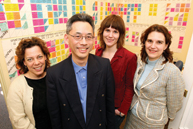Acfas at last
Gearing up for 6,000 delegates

Acfas organizational whizzes, left to right: Susy Ricciardelli, Charles Lin, Morgen Patterson, Jennifer Towell.
Owen Egan
Morgen Patterson sits in a nook of an office in an elegant greystone on University Street. The walls are completely festooned with colourful slips of paper. You'd think she was organizing a carnival, but the bright pink, yellow and blue Post-its herald the countdown on campus to the 74th edition of what has become the largest French-language interdisciplinary conference in North America, and quite possibly the world.
Patterson is part of a trio who've been working for a year on the Quebec-based Association francophone pour le savoir (Acfas) conference being held May 15 to 19 at McGill. Jennifer Towell heads up the organizing team, and Susy Ricciardelli is the coordinator. Patterson takes care of logistics, hence the pop art — like bits of paper, each one representing a session and its location in one of more than 100 classrooms in over 25 buildings on both campuses and at the MNI.
Roughly 6,000 researchers from around the world will attend about 275 thematic colloquia and other sessions, making this conference the biggest yet. McGill researchers, shepherded by a scientific committee with atmospheric and oceanic sciences professor Charles Lin presiding, have put together over 50 colloquia.
This year's theme is "Le savoir: trame de la modernité" (Knowledge: the fabric of modernity). Disciplinary categories include math, life sciences, arts, social sciences, education and a hefty interdisciplinary section.
There will be a mid-week public event on the Arctic, organized in conjunction with the annual meeting of the Geological Association of Canada and the Mineralogical Association of Canada. Quebec science journalist Sophie-Andrée Blondin will be part of a panel discussion on "Climate change, the Arctic and the sub-Arctic: What does the future hold?"
"The conference's raison d'être is to promote knowledge and exchange in French," Towell says. Ironically, most scientific conferences held in France — as well as other countries around the world — are held in English. McGill is solar the only anglophone institution to have hosted the event, which rotates among Quebec universities and occasionally outside the province. If the global language of research is increasingly English, why is a French-language conference so important? Scientific Committee president Charles Lin says that "there's a lot of French science journalism; there are two major scientific magazines in Quebec [Découvrir and Québec Science] and a TV show [Découverte]."
For example, in his field of atmospheric sciences, "some of the Francophone universities are major players."
Towell and Lin remember when the conference was last held at McGill, in 1996. "Now there's a lot more technical equipment available, but the expectations are much higher," Towell says. "Everyone expects multimedia presentations, and we have to ensure a laptop is available to everyone who requests one."
Kathleen Ng of McGill's Environmental Health and Safety Office has been working with the Acfas team to make this conference as green as possible, a trend started at last year's event at Université du Québec à Chicoutimi. The organizers there were so rigorous with recycling and composting that each attendee generated only 130 grams of waste over the duration of the conference. "We can't imagine beating them, but we'll try," says Towell. Delegates will receive a reusable stainless steel coffee mug, and thanks to a donation of recyclable aluminum take-out containers from Reynolds, no styrofoam will be thrown out at mealtimes. Dedicated recycling and composting programs will be undertaken with the help of Building Services and the ultra-green Gorilla Composting student group. Concordia University is lending McGill their part — bio-diesel fuel buses to shuttle conference-goers to and from Macdonald Campus, where a small number of sessions will be held.
At least75 people have contributed to putting together the event, from the folks in Audiovisual to Building Services. "So many people attending is bound to push us out of our comfort zone," says Towell. "It means working hard, and there's a steep learning curve but overall it's been fun."
There's still a need for volunteers. Six thousand guests is an awful lot of people to welcome, give directions to and help with classroom technology. Though more than 50 people have already signed up for the lunch-time volunteer training sessions next week, Towell says there's plenty of room for more. Even just half a day of your time would help.
Interested? Get in touch with Morgen Patterson for more information at 398-1354 or email. Download a volunteer form at www.mcgill.ca/research/acfas.

